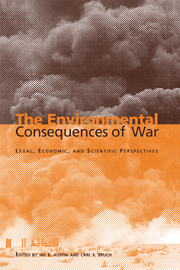Book contents
- Frontmatter
- Contents
- List of illustrations
- List of tables
- List of contributors
- Acknowledgements
- Foreword by Klaus Toepfer
- Introduction
- Part I General principles
- Part II The legal framework
- Introduction
- 2 The law of war and environmental damage
- 3 War and the environment: fault lines in the prescriptive landscape
- 4 The inadequacy of the existing legal approach to environmental protection in wartime
- 5 United States Navy development of operational-environmental doctrine
- 6 In furtherance of environmental guidelines for armed forces during peace and war
- Introduction
- 7 Peacetime environmental law as a basis of state responsibility for environmental damage caused by war
- 8 Environmental damages under the Law of the Sea Convention
- 9 The place of the environment in international tribunals
- 10 Civil liability for war-caused environmental damage: models from United States law
- Part III Assessing the impacts – scientific methods and issues
- Part IV Valuing the impacts – economic methods and issues
- Part V Prospects for the future
- Index
2 - The law of war and environmental damage
Published online by Cambridge University Press: 04 August 2010
- Frontmatter
- Contents
- List of illustrations
- List of tables
- List of contributors
- Acknowledgements
- Foreword by Klaus Toepfer
- Introduction
- Part I General principles
- Part II The legal framework
- Introduction
- 2 The law of war and environmental damage
- 3 War and the environment: fault lines in the prescriptive landscape
- 4 The inadequacy of the existing legal approach to environmental protection in wartime
- 5 United States Navy development of operational-environmental doctrine
- 6 In furtherance of environmental guidelines for armed forces during peace and war
- Introduction
- 7 Peacetime environmental law as a basis of state responsibility for environmental damage caused by war
- 8 Environmental damages under the Law of the Sea Convention
- 9 The place of the environment in international tribunals
- 10 Civil liability for war-caused environmental damage: models from United States law
- Part III Assessing the impacts – scientific methods and issues
- Part IV Valuing the impacts – economic methods and issues
- Part V Prospects for the future
- Index
Summary
The central question addressed here is simple. Are international legal provisions that could restrict environmental damage from military operations adequate? The focus is mainly on the law of war, otherwise known as “international humanitarian law” - a body of law that is applicable in the first place to international wars between states. However, the chapter also touches briefly on: (1) international legal restraints on environmental damage in other situations, including civil wars and UN-authorized operations; and (2) some other international legal restraints on environmental damage in war, especially those embodied in arms control agreements.
This chapter argues that existing legal restraints affecting the impact of war on the environment are far more extensive than may at first appear. They encompass many provisions that – while having as their primary purpose safeguarding people from injury and property from wanton destruction – do in fact also provide a basis for preserving the environment. Extensive as such legal restraints are, there is no claim that they are complete.
In particular, this chapter is a plea to abandon the assumption, made by some lawyers and others, that those very few provisions in the law of war that actually use the word “environment” can be viewed as the centerpiece of legal protection of the environment in war. As will become apparent, such an approach is deficient, because the provisions in question only apply in very exceptional circumstances, and in any case they are in treaties by which fewer states are bound than are bound by certain other relevant treaties, especially the 1949 Geneva Conventions.
Every cause needs to be protected against its own zealots.
- Type
- Chapter
- Information
- The Environmental Consequences of WarLegal, Economic, and Scientific Perspectives, pp. 47 - 86Publisher: Cambridge University PressPrint publication year: 2000
- 8
- Cited by



